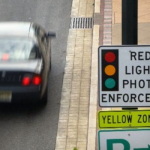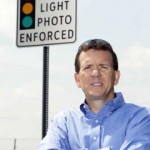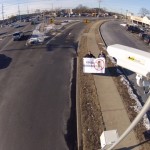Seeing Red Over Red-Light Cameras: A New Jersey doctor fights City Hall
By Dr. Michael Ehrenreich, MD
 It takes quite a bit to get me outraged. I am a busy dermatologist in Millburn, NJ, tending to the rashes and wrinkles of my community. I don’t write Op-Ed pieces or spend my weekends in political protest. When Thomas Jefferson wrote that “a little rebellion now and then is a good thing,” he was not envisioning me.
It takes quite a bit to get me outraged. I am a busy dermatologist in Millburn, NJ, tending to the rashes and wrinkles of my community. I don’t write Op-Ed pieces or spend my weekends in political protest. When Thomas Jefferson wrote that “a little rebellion now and then is a good thing,” he was not envisioning me.
It all started with a traffic ticket, received in the mail, featuring a series of photographs showing a blue Chevy Traverse running a red light in Springfield, NJ, along with a link to a video. Upon review, there is no doubt that the car is mine, but there is also no doubt that at the time of the incident I was in my office seeing patients.
I figured that it would be a simple matter to plead Not Guilty. After all, if I was not the driver of the vehicle, then how could I possibly be guilty? Since the photographs and video do not identify an individual but only a vehicle, it seemed impossible that the state could make a case.
In fact, I was stunned to learn that in New Jersey if your car is caught on a traffic camera running a red light that there is so-called strict liability. This means that if it is your car then you are liable, even if you testify that you were not the operator of the vehicle and even if the State cannot prove that you were.
That’s where my outrage kicks in. I am not a lawyer. I am not versed in constitutional law. But the situation felt wrong. I pleaded Not Guilty—if the State has a case, I figured, let them make it. I started researching New Jersey’s red light camera program in preparation for my day in court. Not surprisingly, I discovered that there’s money at stake. Quite a bit of it.
The red light cameras are installed and operated by a private Australian-based company, Redflex, under a New Jersey Statute crafted specifically for this purpose. Redflex makes a ton of money doing this. For the 12 months ended June 2013, Redflex generated worldwide revenues of approximately $130 million, two-thirds from “fee for service” payments. In other words, Redflex makes money when tickets are issued. It’s a pretty good bet that the cash starved municipalities utilizing Redflex’s system share in the windfall.
With this much money at stake, it was not surprising to find that the same Redflex was the subject of a 2010 whistleblower complaint in Chicago alleging bribery of city officials by Redflex and its consultants. According to Redflex’s 2013 annual report, “The arrangement between the City Program Manager, the Consultant, and Redflex will likely be considered bribery by the authorities.”
My outrage grew. Under the pretense of improving citizen safety at red lights, municipalities have outsourced enforcement to a for-profit firm that reaps rewards from each ticket! Oh…and that for-profit firm pays bribes too.
With my firm belief that my right to due process of law had somehow been violated, I showed up for my court date in Springfield municipal court. I was seated on the left side of the courtroom, along with half a dozen other citizens appearing for red light traffic tickets. I introduced myself to the group and explained that I am a busy doctor, losing a half day’s income to register my protest. I explained that if everyone pleaded Not Guilty and forced the State to make a case then the system would seize up. Red light cameras would stop being profitable. If they were not profitable, the chorus of claims that they enhance intersection safety would suddenly quiet.
One by one, defendants were called from the room by an officer and escorted to a small room with a video monitor to review the footage of their vehicle at the intersection. It was explained that they will absolutely, positively lose this case and in that event will be responsible for court costs as well as the $85 ticket. Not one person returns to the courtroom to plead Not Guilty. They pay their fine and go, leaving me waiting alone on the red light side of the courtroom.
When it is my turn, the Judge is quite polite, making a point of referring to me as “Doctor.” He too explains the law in such a way that it seems a certainty that I will lose. But I proceed and demand a trial. The Judge remains cordial and allows me ample time to make my case—then with no hesitation enters a guilty verdict. This is as expected, and I now begin the process of muddling through an appeals process, learning the procedures and deadlines of the Union County Superior Court.
My arguments are mostly legal. The red light camera statute is illegal and violates the 5th and 14th amendments of the U.S. Constitution. Liability is assigned solely based on the identification of a vehicle, but not its driver. This scheme violates the fundamental concept of fairness in that it criminally punishes an individual for an action without requiring that the individual actually commit any act. Nothing can be more abhorrent to our legal tradition. If due process means anything, it must mean, at the very least, that the government may not punish someone for an act that he or she did not commit.
I also argue that New Jersey Title 39-4-8.15 violates the rules of evidence and the confrontation clause of the sixth amendment. In this case, a police officer testified regarding the Redflex system. However, nobody from Redflex testified as to the origination or veracity of the video. The testimony by the police officer regarding the Redflex video, without corroboration, is hearsay.
The Superior Court Judge is also quite accommodating, and I am given an opportunity to grandstand in my defense of the constitution. Shortly thereafter, the Judge issues a 10 page written opinion. I lose again. I am not surprised. Based on the Judge’s ruling, and the citation of an Appellate court case, State v Melsky, I decide against pursuing additional appeals.
Although it may seem that I have had my day in court, there remains the fact that I have been found guilty as the owner of a vehicle for its operation, despite the fact that it can be proved beyond a shadow of a doubt that I was not the driver. The State hides behind the definition of this sort of infraction as “quasi-criminal.” Inasmuch as no motor vehicle points are involved, it is claimed that the Confrontation Clause does not apply. The red light camera statute was in fact specifically crafted to dodge this constitutional issue.
Back to Thomas Jefferson. He wrote that “Should things go wrong at any time, the people will set them to rights by the peaceable exercise of their elective rights.” I hope that this proves the case in New Jersey as it has in other municipalities — Globe, AZ and Hayward, CA city councils voted to give Redflex the boot. Many other cities have similarly dismantled their red light camera enforcement programs.
If you oppose red light cameras in your town, let your city council members know that this will be an issue in the next election. Let your assembly members and senators know that you expect them to work in Trenton to dismantle the red light camera statute. If you receive a red light camera ticket make your protest heard. Show up in court and plead Not Guilty. Make the State earn its $85.
Michael Ehrenreich, MD, is the founder of SOMA Skin & Laser and the inventor of the Zigo, which is the coolest bike ever.
This column was first published on PolitickerNJ.










Traffic cameras are just another form of Policing for Profit as Capitalism distorts our Justice System. These companies are bottom-feeders and take a 40% cut of the tickets while creating MORE dangerous intersections by fixing the lengths of yellow lights to entrap drivers. You can read about how private companies and crooked politicians have turned our Police forces on their ear in every attempt to squeeze money out of the general public at http://dregstudiosart.blogspot.com/2012/08/the-privatized-police-state.html